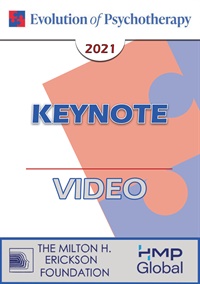- Average Rating:
- Not yet rated
- Topic Areas:
- Addiction | Attachment | Couples Therapy | Keynotes | Love | Relationships
- Categories:
- Evolution of Psychotherapy | Evolution of Psychotherapy 2021
- Faculty:
- Helen E. Fisher, PhD
- Course Levels:
- Master Degree or Higher in Health-Related Field
- Duration:
- 1 hour
- Format:
- Audio and Video
- Original Program Date:
- Dec 03, 2021
- Short Description:
- Is technology changing love? Why do you fall in love with one person rather than another? Why is the rejected brain primed for psychotherapy? How can you use neuroscience to keep love alive? And where are we headed in our digital age? Anthropologist and neuroscientist Dr. Helen Fisher uses her brain scanning work (fMRI) to discuss three basic brain systems that evolved for mating and reproduction--the sex drive, romantic love, and attachment; each plays a pivotal role in human health and happiness. And she uses her data on 50,000 single Americans to explain a new (and positive) trend in courtship, what she calls “slow love.” She then discusses her data on the biological foundations of human personality—specifically four basic styles of thinking and behaving that impact love relationships and all other social interactions.
- Price:
- $59.00 - Base Price
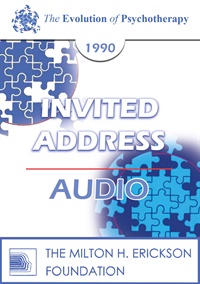
- Average Rating:
- Not yet rated
- Topic Areas:
- Invited Addresses | Addiction | Community | Social Issues | Psychotherapy
- Categories:
- Evolution of Psychotherapy | Evolution of Psychotherapy 1990
- Faculty:
- Thomas Szasz, MD | Rollo May, PhD
- Duration:
- 1 Hour 20 Minutes
- Format:
- Audio Only
- Original Program Date:
- Dec 15, 1990
- Short Description:
- Dr. Szasz will present a brief historical review of drug controls in the United States; a critical analysis of the transformation of the trade in drugs from a free market at the beginning of the century to a tightly statist system of controls today; and a market-oriented analysis of the "drug problem."
- Price:
- $15.00 - Base Price
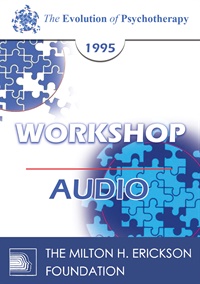
- Average Rating:
- Not yet rated
- Topic Areas:
- Workshops | Addiction | Homework | Psychotherapy | Treatment Planning
- Categories:
- Evolution of Psychotherapy | Evolution of Psychotherapy 1995
- Faculty:
- Claudia Black, PhD
- Duration:
- 2 Hours 50 Minutes
- Format:
- Audio Only
- Original Program Date:
- Dec 13, 1995
- Short Description:
- Those who grow up in chemically dependent families have strong survivorship skills. Unfortunately, for too many, they continue to present to the world a false self often becoming our "closeted" depressed, angry and addicted client. This workshop focuses on 1) treatment orientation and priorities, and 2) core clinical issues. Due to the managed care environment, experiential focus will be on homework assignments.
- Price:
- $15.00 - Base Price
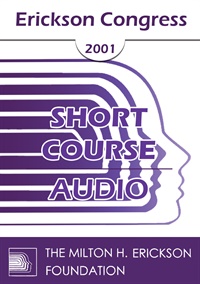
- Average Rating:
- Not yet rated
- Topic Areas:
- Short Courses | Borderline | Ericksonian Hypnosis and Therapy Techniques | Hypnosis | Addiction
- Categories:
- Erickson Congress 2001 | Erickson Congress
- Faculty:
- Ilana Oren, Ph.D., Sc.D., LMFT
- Duration:
- 1:27:05
- Format:
- Audio Only
- Original Program Date:
- Dec 06, 2001
- Short Description:
- IC01 Short Course 07 - The Use of Ericksonian Hypnosis in the Treatment of Borderlines and Addictions - IIana H. Oren, PhD Borderline personality is an underlying character structure, marked by a fragmented sense of identity and maladaptive patterns of perceiving, behaving and relating to others. The Borderline is stuck in "yes, but!" or "I hate you! Don't leave me!" stance. In order to get the habitually oppositional patient to respond, the therapist needs to structure the therapeutic messages in a way that they are not easily recognized on a conscious level. Ericksonian hypnosis paves the way.
- Price:
- $15.00 - Base Price
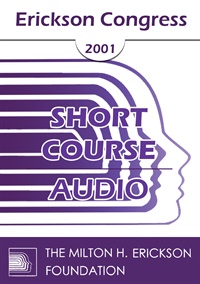
- Average Rating:
- Not yet rated
- Topic Areas:
- Short Courses | Addiction | Utilization | Abuse | Brief Therapy | Ideomotor
- Categories:
- Erickson Congress 2001 | Erickson Congress
- Faculty:
- Bart Walsh, MSW
- Duration:
- 1:20:20
- Format:
- Audio Only
- Original Program Date:
- Dec 06, 2001
- Short Description:
- This presentation poses a substance abuse treatment which acknowledges and accommodates the personal needs being addressed by substance use, bypasses perceived resistance and employs idiosyncratic psycho-biological learning to achieve a body-mind gestalt complementary to the client's sobriety. Client self-empowerment and relapse prevention are built into the intervention. This method develops a safe framework for addressing any subsequent mental health themes directly or indirectly related to substance misuse. Ideomotor questioning is employed in this procedure.
- Price:
- $15.00 - Base Price
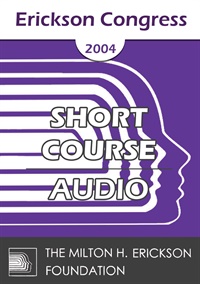
- Average Rating:
- Not yet rated
- Topic Areas:
- Short Courses | Utilization | Addiction | Abuse
- Categories:
- Erickson Congress | Erickson Congress 2004
- Faculty:
- Bart Walsh, MSW
- Duration:
- 1:19:37
- Format:
- Audio Only
- Original Program Date:
- Dec 02, 2004
- Short Description:
- This workshop poses a brief substance abuse treatment which acknowledges and accommodates the personal needs being addressed by substance abuse. Client self-empowerment and relapse prevention are built into the intervention. This method develops a safe framework for addressing any subsequent mental health themes directly or indirectly related to substance misuse. A particular form of body language know as ideomotor signaling is established in this procedure.
- Price:
- $15.00 - Base Price
Tags: Abuse Addiction Utilization Ideomotor
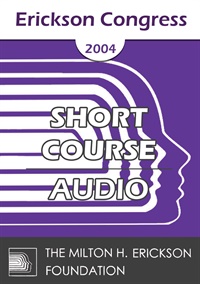
- Average Rating:
- Not yet rated
- Topic Areas:
- Short Courses | Addiction | Anxiety | Attention Deficit Disorder (ADD) | Depression | Panic | Personality Disorders | Post-Traumatic Stress Disorder (PTSD) | Hypnosis | Neuroscience
- Categories:
- Erickson Congress | Erickson Congress 2004
- Faculty:
- D. Corydon Hammond, PhD
- Duration:
- 1:19:45
- Format:
- Audio Only
- Original Program Date:
- Dec 02, 2004
- Short Description:
- Neurofeedback allows us to retrain brainwave patterns associated with problems of depression, substance abuse, ADD/ADHD, learning disabilities, anxiety and panic disorder, insomnia, headaches, migraines, head injuries, stroke, Tourette's, epilepsy, fibromyalgia, chronic fatigue, PTSD, enuresis and physical balance. Neurofeedback is also used in peak performance training and countering cognitive decline with aging. Integrating hypnosis with neurofeedback is ideal for treating many of these problems. A live demonstration will be included.
- Price:
- $15.00 - Base Price
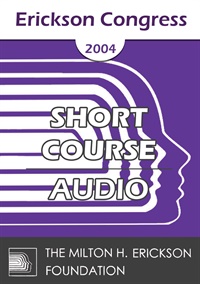
- Average Rating:
- Not yet rated
- Topic Areas:
- Short Courses | Borderline | Eating Disorders | Ericksonian Hypnosis and Therapy Techniques | Hypnosis | Personality Disorders | Addiction | Utilization
- Categories:
- Erickson Congress | Erickson Congress 2004
- Faculty:
- Ilana Oren, Ph.D., Sc.D., LMFT
- Duration:
- 1:19:45
- Format:
- Audio Only
- Original Program Date:
- Dec 02, 2004
- Short Description:
- Have you worked with the patient who one day idealized you and next devalued your skills? The Borderline, who finds refuge in food addiction. Borderline personality is an underlying character structure, marked by a fragmented sense of identity and maladaptive patterns of perceiving, behaving and relating to others. Food provides a soothing antidote to feeling of shame, betrayal and the longing for a positive mother. Ericksonian hypnosis paves the way to reach the habitually oppositional patient.
- Price:
- $15.00 - Base Price
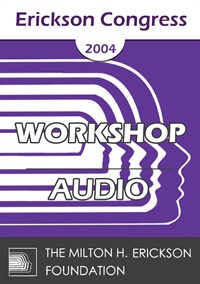
- Average Rating:
- Not yet rated
- Topic Areas:
- Workshops | Addiction
- Categories:
- Erickson Congress | Erickson Congress 2004
- Faculty:
- Gunther Schmidt, MD, MA
- Duration:
- 2:33:19
- Format:
- Audio Only
- Original Program Date:
- Dec 04, 2004
- Short Description:
- Addiction problems usually are treated and understood as signs of personal deficits, ego-weakness and other incompetences. In this workshop, it will be demonstrated how, from a hypno-systemic view, addictions can be understood as the result of dissociated trance states which are unconscious attempts at solution, most often in loyalty-double binds. The addiction ritual has the function of a search which expresses an unconscious knowledge about the dissociated longing for an experience of meaning and fulfillment in relationships and life. This workshop will show many hypno-systemic strategies which translate the knowledge hidden in the addiction and utilize it for healthier solutions for both personal individuation and enriching relationships.
- Price:
- $15.00 - Base Price
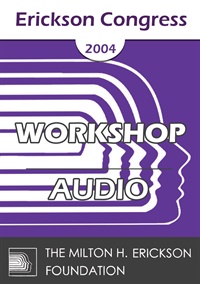
- Average Rating:
- Not yet rated
- Topic Areas:
- Workshops | Addiction | Ericksonian Hypnosis and Therapy Techniques | Psychology | Habits
- Categories:
- Erickson Congress | Erickson Congress 2004
- Faculty:
- Brian Grodner, PhD
- Duration:
- 2:39:30
- Format:
- Audio Only
- Original Program Date:
- Dec 05, 2004
- Short Description:
- Explore Ericksonian and other strategies within a framework of positive internalized habit and addiction control. Many metaphors, inductions, images, suggestions, reframings, tasks and understandings will be shared and experienced through every step of the therapeutic process in weight control, smoking cessation, and treating other unwanted habit and addictive problems.
- Price:
- $15.00 - Base Price
Please wait ...


